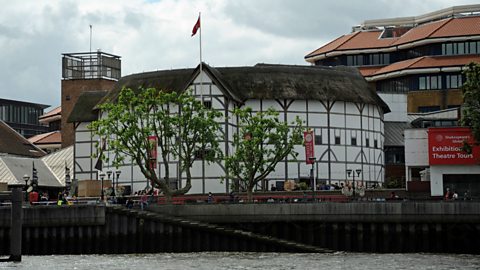Staging choices in Macbeth
Although there are many similarities between the theatres of Shakespeare's time and the theatres of today, there are big differences too. Nowadays the audience is used to sitting in a large darkened room, watching a piece of drama in near silence. In the theatres of the late 16th and early 17th centuries, plays were more often than not performed during daylight in spaces open to the elements. Most of the audience stood and were not hesitant to make their feelings known, whether these were positive or negative.

Possibly the biggest difference we would notice is how the plays were staged. Staging a play is the part of the overall creative process which involves making choices about the design and the supportive elements of a piece of drama, namely:
- lighting
- sound
- effects
- costume
- scenery
- props (or properties)
Lighting
- In Shakespeare's time, plays were usually performed in natural daylight. A handful of indoor theatres used candlelight. There was no electricity so there was no stage lighting as we understand it. Nowadays, plays are generally performed inside, using sophisticated computer technology and variable lighting rigs.
- In Macbeth, many scenes take place at night or in gloomily lit rooms inside castles. Other scenes are set outside during bad weather.
- Key events in which lighting might help to create atmosphere: the Witches' first appearance; King Duncan's murder; Lady Macbeth sleepwalking.
Sound
- In Shakespeare's time, basic "live" sound effects were used, such as a machine for making the noise of thunder. Music and effects were performed by live musicians. Now, digital recordings are used, which can be operated via a computer.
- In Macbeth, noise is an important element often used for shock value – like the owl shrieking as Duncan is murdered.
- Key events in which sound might help to create atmosphere: the knocking the Macbeths hear after Duncan's murder; thunder in the Witches' scenes; the final battle.
Effects
- In Shakespeare's time, effects were limited at best. Now, they are far more sophisticated and complex.
- In Macbeth, as the play is full of ghosts and spirits and deals with the supernatural, there are plenty of opportunities to use effects.
- Key events where effects could be used: the dagger in Macbeth's vision, Banquo's ghost at the banquet, the Witches' apparitions.
Costume
- Actors tended to wear the clothes of the current period, with no attempt made at historical accuracy. Now, a full range of costumes are available and used according to the vision of the director.
- In Macbeth, traditional Scottish dress is possible but obvious. Often the men wear military uniforms. The costumes chosen depend entirely on the director's vision of the play..
- Key considerations: what clothing will the Witches wear?; how will the audience distinguish between Macbeth's and Malcolm's supporters?; possible use of symbolic colours.
Scenery
- Back then, very little scenery was used. Locations were mainly shown by the use of props: for instance, a throne to represent a king’s castle. Now, scenery can still be simple but can also be spectacular, with increasing use made of video projection.
- In Macbeth, this depends on the director's vision. The play is supposed to be set mostly in Scotland and covers various locations – heathland, castle rooms, woodland and battlefields, to name a few.
- Key considerations: moving locations without lengthy scene changes, showing the difference between internal and external scenes; how will Birnam Wood 'move' to Dunsinane?
Props
- There were a limited selection of easily movable and easily storable objects which might feature in a number of plays, for example, swords. Now, props will be historically accurate and if not readily available can be created more easily.
- Important props: Duncan and Macbeth's crown, the bloody daggers used in the murder, the Witches' ingredients for the spell.